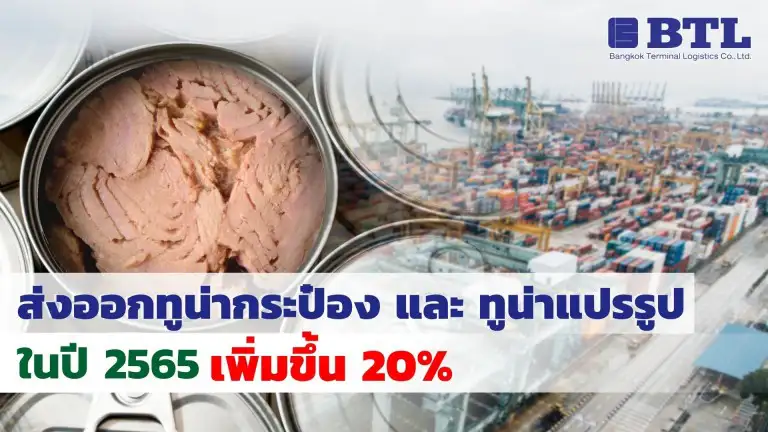Thailand's Canned and Processed Tuna Exports Grew by 20% in 2022
February, 2 2023

Between January and November 2022, Thailand exported 454,852 tons of canned and processed tuna, with a total value of 2.014 billion USD (approximately 69.827 billion THB). Compared to the same period in 2021, the export volume increased by 6.13%, and the export value rose by 27.59%.
Main Export Markets:
- United States
- Australia
- Japan
- Egypt
- Libya
These countries accounted for 56.06% of total Thai tuna exports.
Markets with High Growth Rates:
- Libya (109.87%)
- Kuwait (81.64%)
- Israel (69.77%)
Strengths of Thailand’s Tuna Industry
- Advanced production skills and technology – Thailand’s integrated production process meets international standards and can efficiently adapt to market demands.
- Strategic geographic location – Thailand has a strong advantage in sourcing tuna from around the world.
- Extensive supply chain network – Thai producers have a well-established system covering raw material sourcing, manufacturing, and product distribution in major markets.
Challenges and Obstacles
- Labor shortages
- Increasing trade barriers such as environmental regulations, labor policies, and tax measures, as well as preferential tax benefits for competitors.
- Lengthy export documentation process, leading to delays in shipments.
- Negative media reports affecting Thailand’s seafood industry reputation.
- Shifting consumer trends – The rising demand for healthy food is leading to a decline in canned and processed food consumption.
- Impact of COVID-19 – The pandemic caused delays in orders and shipments.
Strategies to Enhance Competitiveness
- Strengthening quality control systems and improving seafood processing infrastructure to meet international sanitary standards.
- Strict compliance with market regulations and customer requirements.
- Implementing good labor practices (GLP) to ensure ethical labor conditions.
- Enhancing traceability systems and encouraging the use of raw materials from sustainable fisheries, preventing illegal, unreported, and unregulated (IUU) fishing.
- Adding value to tuna products and utilizing by-products for sustainable industry growth.
- Expanding into new high-potential markets and relocating production bases to key export destinations to reduce costs and mitigate exchange rate risks.
- Negotiating trade barriers to reduce both tariff and non-tariff restrictions through bilateral and multilateral agreements.
- Public relations campaigns to highlight Thailand’s efforts in addressing industry challenges.
Canned Tuna Export Process
Canned tuna refers to tuna species such as Thunnus (tuna), Skipjack (striped-belly bonito), and Bonito (Sarda species), either whole or in pieces, packed in airtight containers. The tariff classification for canned tuna falls under 1604.14.11 and 1604.14.19.
Steps for Exporting Canned Tuna
- Verify trade agreement benefits and obtain Certificate of Origin documentation.
- Register for an Export-Importer ID Card through the Department of Foreign Trade (DFT) and obtain necessary trade forms (e.g., Form D, Form E, Form JTEPA).
- Ensure compliance with the country of origin requirements for preferential tariff treatment.
- Check import regulations and obtain necessary permits or certifications.
Regulatory Authorities Involved in Tuna Exports
Department of Foreign Trade (DFT), Ministry of Commerce
- Requires canned tuna exporters to adhere to export regulations under the Royal Decree on Export Control of 2014 (enacted on October 15, 2014).
- Exporters must be members of the Thai Tuna Industry Association.
- Exemptions apply for personal consumption, transport use, sample testing, or research purposes.
Customs Department
- Requires registration for electronic customs procedures (Paperless System).
- Exporters must submit outbound shipment data electronically (e-Export).
- Exporters can apply for tax benefits such as tariff rebates or duty-free zones under the Board of Investment (BOI).
Department of Fisheries
- Register for the Fisheries Single Window (FSW) system for export clearance.
- Obtain an FSW export license and undergo a pre-export inspection.
Industrial Standards Institute
- Requires certification of industrial standards (TISI certification) for export approval.
Food and Drug Administration (FDA)
- Requires a Certificate of Free Sale for exported food products.
The Central Islamic Council of Thailand
- Requires Halal certification and product certification for Halal exports.